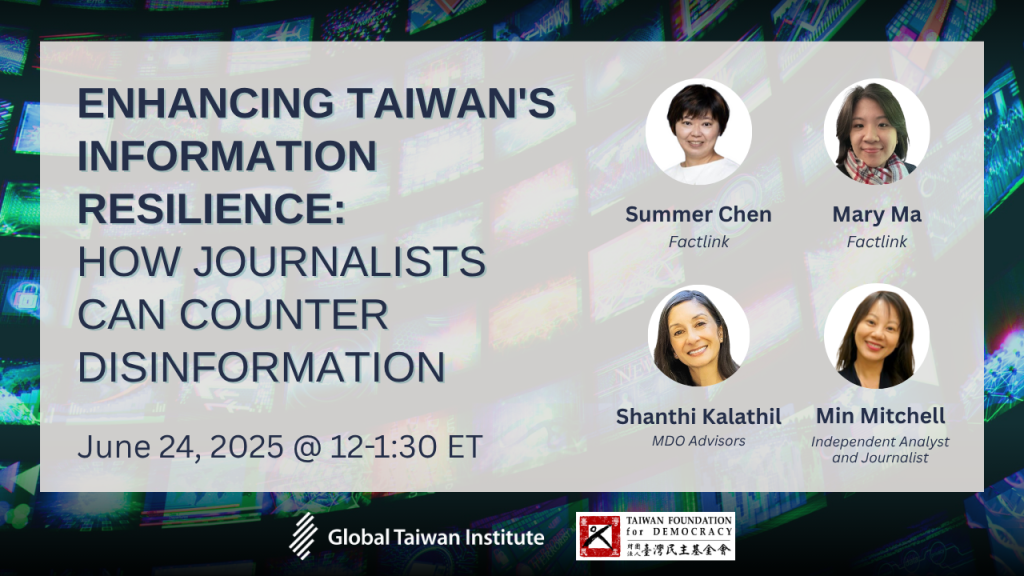Listen to the article
Taiwan’s information resilience specialists gathered this week to address growing concerns about sophisticated disinformation campaigns targeting the island democracy, with experts highlighting the urgent need for cross-border collaborations between journalists and fact-checkers.
The Global Taiwan Institute (GTI) hosted a public seminar titled “Enhancing Taiwan’s Information Resilience: How Journalists can Counter Disinformation” on June 24, bringing together specialists from fact-checking organizations and media analysis backgrounds to discuss emerging threats and potential solutions.
Summer Chen and Mary Ma from Taiwan-based FactLink identified three critical challenges facing Taiwan’s information ecosystem. First, they pointed to the alarming surge in AI-generated disinformation, which has overwhelmed fact-checkers with its sheer volume. Second, disinformation actors have become increasingly sophisticated at concealing their origins and manipulating Taiwan’s open media landscape. Third, “gray zone” information operations have emerged as a significant concern, operating in ambiguous spaces that make them difficult to counter effectively.
“Disinformation campaigns have pivoted their focus to planting bait on social media, where manipulated content is picked up by the press—whose freedom of expression is protected,” Chen explained during the panel discussion moderated by GTI Senior Programs Manager Adrienne Wu.
The FactLink representatives cited specific examples of recent disinformation campaigns, including false reports about Taipei City fining motorcyclists without face masks during the COVID-19 pandemic. They also discussed the controversial case of “Yaya,” a Chinese spouse whose residency was revoked after producing content promoting Taiwan’s armed reunification with China. These campaigns, the experts noted, aim to divide public opinion while distracting attention from China’s political and military activities.
Min Mitchell, former Executive Editor at Radio Free Asia (RFA), characterized journalists as “the critical infrastructure of democratic resilience” when working across borders, languages, and platforms. Drawing on her experience in both Taiwanese and American media environments, Mitchell outlined three cooperative approaches to counter disinformation: cross-border investigative partnerships, training and exchange programs, and advocacy for greater accountability from global technology platforms.
Mitchell highlighted Taiwan’s unique position in understanding authoritarian tactics, noting that “Taiwan’s unique insight into the tactics of authoritarian regimes positions it as a key contributor to such collaborations.” She praised Taiwan’s civic tech community, led by figures like former Digital Minister Audrey Tang, for working collaboratively with journalists to combat disinformation in real time.
Despite these efforts, Mitchell identified significant vulnerabilities in Taiwan’s media landscape. “Most Taiwanese media do not have fact checkers and standards editors in their newsroom,” she observed, adding that many young Taiwanese are continuously exposed to surveillance and disinformation through Chinese-owned applications such as Xiaohongshu, Douyin (TikTok), and WeChat.
Shanthi Kalathil, founder of MDO Advisors and visiting senior fellow at the German Marshall Fund of the US, focused on the evolving nature of China’s information manipulation strategies. She described a range of tactics from official media channels to casual information delivery through face-to-face interactions and influencers, all aimed at guiding public opinion while censoring sensitive topics.
Kalathil identified two recent developments that have worsened the global information environment: declining financial support for civil society efforts and the emergence of artificial intelligence and large language models (LLMs). “International fact-checking groups and small independent media outlets face a dearth of financial resources and institutional support, limiting their capacity against authoritarian powers,” she noted.
Of particular concern is the rise of Chinese-developed LLMs, which Kalathil suggested could significantly influence the global information landscape in the future. She cited DeepSeek as an example of an open-source, adaptable, and affordable model that developing countries might adopt, potentially carrying embedded information controls and narratives aligned with Beijing’s interests.
The panelists collectively proposed several recommendations, including the formation of an AI-verification community comprising tech experts and journalists, enhanced training for media professionals in identifying disinformation, and strengthened international partnerships to counter campaigns with regional implications.
As Taiwan continues to face sophisticated information operations, the seminar highlighted the crucial role of collaboration between journalists, fact-checkers, civil society organizations, and international partners in building resilience against attempts to undermine democratic institutions and public discourse.
Fact Checker
Verify the accuracy of this article using The Disinformation Commission analysis and real-time sources.




10 Comments
It’s encouraging to see Taiwan taking proactive steps to strengthen its information resilience. Transnational cooperation between media and civil society will be vital in countering these complex disinformation campaigns.
The surge in AI-generated disinformation is a major concern. Taiwan’s fact-checkers have their work cut out for them, but this cross-border collaboration seems like a step in the right direction.
This is a critical issue for Taiwan’s democracy. The surge in AI-generated disinformation is alarming and fact-checkers need more resources and tools to keep up. Enhancing public media literacy will also be key.
Absolutely, manipulating the open media landscape is a worrying tactic. Journalists and fact-checkers must remain vigilant and coordinated in their efforts.
Interesting to see how Taiwan is tackling the growing challenge of disinformation. Cross-border collaboration between journalists and fact-checkers will be crucial to bolstering information resilience in the face of sophisticated AI-driven campaigns.
Agreed, the ‘gray zone’ information operations are especially concerning and require innovative solutions.
Disinformation is a serious threat to Taiwan’s democracy. Kudos to the experts for highlighting the need for journalists and fact-checkers to work together in countering these sophisticated campaigns.
Agreed, the ‘gray zone’ information operations are especially insidious and require innovative solutions. Taiwan is setting an important precedent here.
Sophisticated disinformation is a global challenge, but Taiwan’s experience highlights the unique risks faced by smaller democracies. Kudos to the experts for identifying key priorities like better AI detection and ‘gray zone’ operations.
Absolutely, the scale and evolving tactics of these campaigns require a multi-pronged response. Taiwan is setting an important example for other countries to follow.